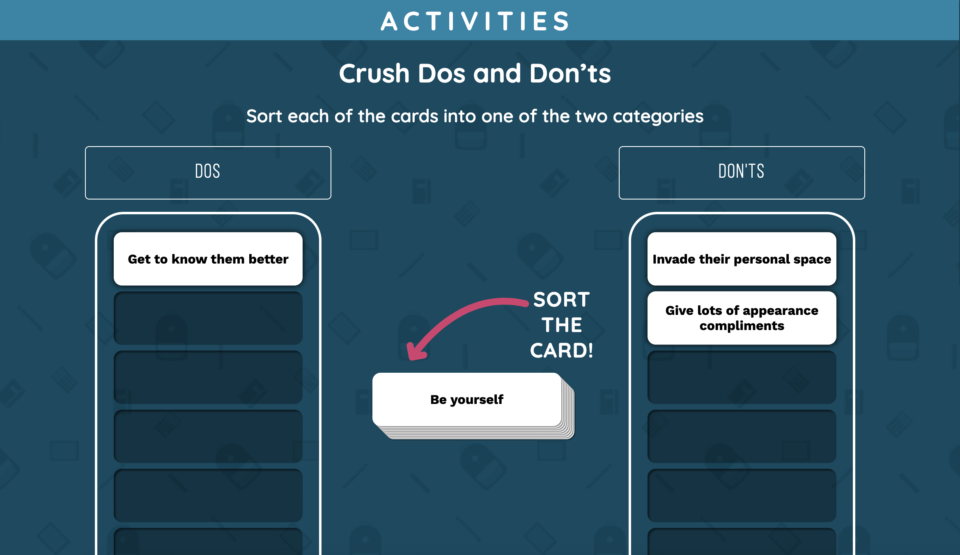
Crushes are an exciting, sometimes confusing part of teenage life. For high school students, especially those with unique learning needs, understanding how to handle these emotions can be a challenge. As a special educator, you play a critical role in helping students learn about social boundaries, appropriate behavior, and respectful interactions. Everyday Speech offers a practical solution with its “Crush Dos and Don’ts” activity, which supports you in helping high schoolers manage crushes appropriately.
Let’s dive into the dos and don’ts, and how you can use this tool to guide meaningful learning.
What is the “Crush Dos and Don’ts” Activity?
The “Crush Dos and Don’ts” activity is a sorting game that helps students differentiate between appropriate and inappropriate actions when they have a crush. Students sort cards into two categories: “Dos” and “Don’ts,” gaining insight into healthy social behaviors. This interactive approach is perfect for special education students who benefit from clear, visual guidance.
With this activity, you can easily explain complex social concepts in a way that feels approachable and engaging. Everyday Speech’s Relationships unit, which includes this activity, is an invaluable resource for helping students understand how to handle crushes and early dating experiences.
The Dos of Handling Crushes
The “Crush Dos and Don’ts” activity encourages positive, respectful interactions. Here are some “dos” your students will explore through the activity.
1. Get to Know Them Better
Building a friendship first is essential. Teach students that developing a connection is the first step to any relationship. This action is respectful and helps them understand the importance of taking things slow.
2. Be Yourself
Authenticity matters. Encourage students to feel comfortable being themselves around a crush. This builds confidence and promotes positive self-image.
3. Respect Personal Space
Maintaining appropriate physical and emotional boundaries is crucial. Students learn to respect personal space, an essential social skill that fosters trust and mutual comfort in any relationship.
The Don’ts of Handling Crushes
The activity also addresses behaviors to avoid. Understanding these “don’ts” helps students navigate social situations with more awareness and empathy.
1. Don’t Invade Personal Space
Crowding or being physically too close can make others uncomfortable. This reminds students to respect boundaries, a key skill that Everyday Speech emphasizes in all relationship activities.
2. Don’t Give Lots of Appearance Compliments
Too many compliments, especially on appearance, can feel overwhelming. Instead, students learn to focus on personality traits or shared interests, making interactions more genuine and balanced.
3. Avoid Being Overly Persistent
Pursuing someone who doesn’t show the same level of interest can lead to uncomfortable situations. This helps students recognize when to take a step back and respect others’ feelings.

Teaching with Everyday Speech’s “Crush Dos and Don’ts” Activity
Using the “Crush Dos and Don’ts” activity is simple and impactful. Start by introducing the concept of crushes and how feeling nervous or shy is completely normal. Explain that understanding how to act around a crush is essential for building respectful relationships.
Here’s a step-by-step approach:
- Introduce the Activity
Begin by reading the introduction text in the activity: “When we have a crush, we might feel nervous, shy, or giddy around them—this is normal! But how do we know how to act around our crush? Let’s practice our crush Dos and Don’ts.” This sets the tone and helps students relate to the topic. - Explain Each Card as Students Sort
As students drag each card to either the “Dos” or “Don’ts” column, take a moment to discuss why each behavior is appropriate or not. This adds depth to their understanding and allows them to ask questions. - Encourage Reflection
After the activity, engage in a brief discussion. Ask students how they would feel if someone treated them with respect or, conversely, invaded their personal space. This helps solidify the lesson and makes it relatable. - Review and Reinforce
Reinforce these lessons over time. Everyday Speech’s Relationships unit provides additional resources to help reinforce these concepts, ensuring students feel supported and prepared.
Frequently Asked Questions for Special Educators
Q: How do I help a student who gets frustrated if a crush doesn’t feel the same way?
A: Remind them that it’s okay if feelings aren’t mutual. Encourage students to focus on friendship first and respect boundaries. Learning to handle rejection is an essential social skill.
Q: How can I make the activity more engaging for students?
A: Use real-life examples or role-play scenarios to bring the dos and don’ts to life. Adding humor or relatable examples can make the activity feel less formal and more enjoyable.
Q: Is it okay to let students talk about their crushes in class?
A: As long as the conversation is respectful and appropriate. Having an open dialogue can make students feel comfortable and supported, allowing them to learn in a safe environment.
Unlock more high school materials by signing up for your free trial today – no credit card required!
Access the full Social Communication Curriculum HERE!
Instant access to thousands of no-prep social skills activities, over 1000+ video lessons, and engaging games designed to enhance learning and development.
Why Choose Everyday Speech for Teaching Relationship Skills?
Everyday Speech’s “Crush Dos and Don’ts” activity is just one part of its comprehensive Relationships unit, designed specifically for students in special education. With video modeling, interactive activities, and clear, relatable content, Everyday Speech helps educators teach complex social skills with ease. This unit not only prepares students for dating but also equips them with essential social tools for friendships and other relationships.
The “Crush Dos and Don’ts” activity is especially effective for high schoolers, helping them manage crushes in a positive, structured way. By using these resources, you can provide students with the skills they need to build respectful, healthy relationships.
Helping High Schoolers Manage Crushes with Everyday Speech
By focusing on social boundaries, self-respect, and communication, you’re setting the stage for students to form positive relationships now and in the future. Whether through one-on-one guidance or classroom activities, you’re helping students develop critical skills that will benefit them throughout their lives.
By incorporating Everyday Speech’s comprehensive resources, including this activity, you can make a lasting impact on your students’ social lives and emotional development. Start helping high schoolers manage crushes today with Everyday Speech’s Relationships unit, and see the positive changes in their interactions and self-confidence.
Sample Video
Students learn best by watching others their same-age model the behavior! Check out a sample video modeling lesson below. We offer our entire Social-Emotional Learning platform free for 14 days here!
Related Blog Posts:
Navigating High School Challenges: Problem-Solving Techniques for Social Emotional Growth
Teaching Middle School Students to Stay Calm and Solve Problems
Promoting Mental Well-being: SEL Lessons for Middle School Students

